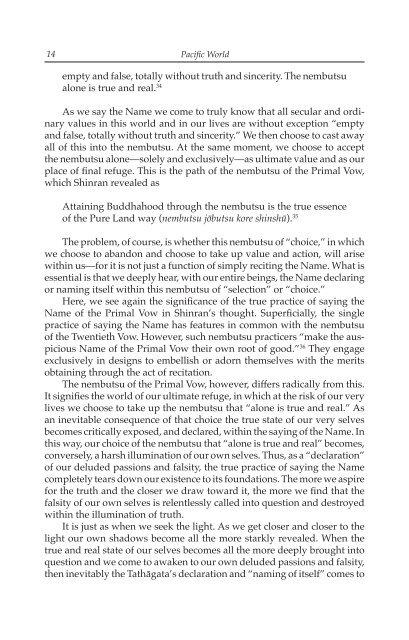PACIFIC WORLD - The Institute of Buddhist Studies
PACIFIC WORLD - The Institute of Buddhist Studies
PACIFIC WORLD - The Institute of Buddhist Studies
You also want an ePaper? Increase the reach of your titles
YUMPU automatically turns print PDFs into web optimized ePapers that Google loves.
14<br />
Pacific World<br />
empty and false, totally without truth and sincerity. <strong>The</strong> nembutsu<br />
alone is true and real. 34<br />
As we say the Name we come to truly know that all secular and ordinary<br />
values in this world and in our lives are without exception “empty<br />
and false, totally without truth and sincerity.” We then choose to cast away<br />
all <strong>of</strong> this into the nembutsu. At the same moment, we choose to accept<br />
the nembutsu alone—solely and exclusively—as ultimate value and as our<br />
place <strong>of</strong> final refuge. This is the path <strong>of</strong> the nembutsu <strong>of</strong> the Primal Vow,<br />
which Shinran revealed as<br />
Attaining Buddhahood through the nembutsu is the true essence<br />
<strong>of</strong> the Pure Land way (nembutsu jōbutsu kore shinshū). 35<br />
<strong>The</strong> problem, <strong>of</strong> course, is whether this nembutsu <strong>of</strong> “choice,” in which<br />
we choose to abandon and choose to take up value and action, will arise<br />
within us—for it is not just a function <strong>of</strong> simply reciting the Name. What is<br />
essential is that we deeply hear, with our entire beings, the Name declaring<br />
or naming itself within this nembutsu <strong>of</strong> “selection” or “choice.”<br />
Here, we see again the significance <strong>of</strong> the true practice <strong>of</strong> saying the<br />
Name <strong>of</strong> the Primal Vow in Shinran’s thought. Superficially, the single<br />
practice <strong>of</strong> saying the Name has features in common with the nembutsu<br />
<strong>of</strong> the Twentieth Vow. However, such nembutsu practicers “make the auspicious<br />
Name <strong>of</strong> the Primal Vow their own root <strong>of</strong> good.” 36 <strong>The</strong>y engage<br />
exclusively in designs to embellish or adorn themselves with the merits<br />
obtaining through the act <strong>of</strong> recitation.<br />
<strong>The</strong> nembutsu <strong>of</strong> the Primal Vow, however, differs radically from this.<br />
It signifies the world <strong>of</strong> our ultimate refuge, in which at the risk <strong>of</strong> our very<br />
lives we choose to take up the nembutsu that “alone is true and real.” As<br />
an inevitable consequence <strong>of</strong> that choice the true state <strong>of</strong> our very selves<br />
becomes critically exposed, and declared, within the saying <strong>of</strong> the Name. In<br />
this way, our choice <strong>of</strong> the nembutsu that “alone is true and real” becomes,<br />
conversely, a harsh illumination <strong>of</strong> our own selves. Thus, as a “declaration”<br />
<strong>of</strong> our deluded passions and falsity, the true practice <strong>of</strong> saying the Name<br />
completely tears down our existence to its foundations. <strong>The</strong> more we aspire<br />
for the truth and the closer we draw toward it, the more we find that the<br />
falsity <strong>of</strong> our own selves is relentlessly called into question and destroyed<br />
within the illumination <strong>of</strong> truth.<br />
It is just as when we seek the light. As we get closer and closer to the<br />
light our own shadows become all the more starkly revealed. When the<br />
true and real state <strong>of</strong> our selves becomes all the more deeply brought into<br />
question and we come to awaken to our own deluded passions and falsity,<br />
then inevitably the Tathāgata’s declaration and “naming <strong>of</strong> itself” comes to

















